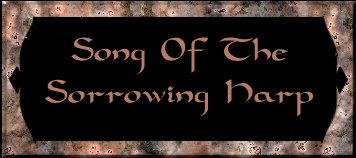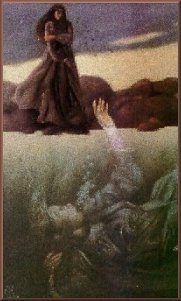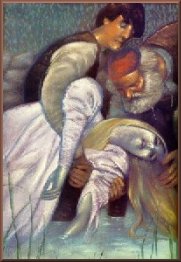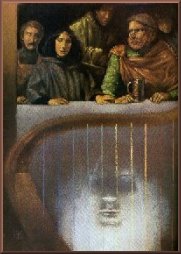

![]()
On the east coast of Scotland, in a castle
hard by the North Sea, lived
a lord who had two daughters, the elder one dark, the younger fair. As
sometimes happens, the maidens were rivals - although the younger sister
did not know it and the elder would not admit it - and something occurred
between them that caused a ghost to speak.
A young lord came
courting. Quite properly, he paid formal addresses to the
elder sister, but his eyes always strayed to the younger. He rode by her at the hunt;
he danced with her in the hall. And all the while, the dark gaze of the elder sister
followed him. She made no complaint, biding her time.
Early one morning, the elder
maiden asked her sister to walk by the seashore.
As they strolled, the fair sister spoke guilelessly about the dashing visitor. The
elder
said little, but at a place where the waves beat against massive rocks, she acted.
With a swift blow, she knocked her sister off balance and into the foaming sea.

The waves closed over the fair
maiden's head and clawed at her hair with icy fingers.
She rose gasping to the surface and screamed to her sister, but there was no
response.
She heard only the roaring of the waters and the sharp cries of gulls as they wheeled
in
the sky above. The dark sister stood on the shore rocks, motionless as a carved
statue. With a steady, unperturbed gaze, she watched her sister's hopeless struggle.
The young maiden sank, rose again for a moment and cried out pitifully, than sank
again beneath the surging skirts of foam.
The dark one kept her vigil
there for a time, observing the violence of the
waves with satisfaction. Then she ran home to her father's hall and, weeping, told
a false tale, saying how her sister had slipped on the rocks and drowned. The people
searched the shore for her, but they could not find her body. They made great
mourning in the months that followed. Afterward, the young lord, bereft of the fair
sister, sought consolation with the dark, and this was gladly given.
But the fair sister's body,
drawn by wind and tide and cradled in the killing waves,
drifted along the Scottish shore and into a calm loch, far from her father's lands. A
miller at the loch's edge spied the golden hair stirring beneath the surface and
gently pulled the body from the water.

It happened that a wandering
minstrel - a Harper famed throughout Scotland - was
staying with the miller. He helped the man to give her burial, and moved by her
beauty, he cut three strands of the golden hair and strung them into his harp.
Eventually the Harper took leave of
the miller and went on his way, traveling from
castle to castle to sing before the lords of the land. In the months that followed,
the
harp played for the minstrel with a tenderness that brought tears to the eyes of its
listeners, and the Harper grew to cherish the golden strings.
At length he came to the stronghold
of the maiden's father, although he did not
know it for what it was. The minstrel was welcomed and feasted, as was the custom
then. In the evening, when the fires were lit and the flames cast flickering shadows
in the hall, the man drew out his harp and set it before him, making ready to sing.
The dark sister settled on a bench to listen, flanked by her father and by the young
lord she loved.
But before the Harper could touch
them, the golden strings shimmered in the
firelight, they trembled of their own accord. A sweet familiar voice eddied around
the company, and when the dark sister heard the words it sang, her face grew pale
and tight. Her fate had come upon her, and well she knew it.
"Farewell to the lord my father," sang the harp softly. "Farewell to my lady mother."
The harp paused, and the company
watched it in horrified silence. Then the strings
spoke once more, loud and wailing this time.

"And woe to my sister, who murdered me."

![]()




